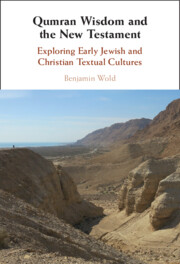‘The fresh analysis of this significant study rests on the recent scholarly insistence that the majority of compositions found in the Qumran caves reflect wider intellectual and spiritual tendencies in late Second Temple Judaism than those associated with one sect alone. Through attention to fine details, Ben Wold discloses convincingly how several sections of James, Matthew and the Pauline Letters resonate with Jewish wisdom motifs broadly conceived. New light is shed on cosmology, perfection, poverty, humility, debt remission, flesh and household codes, both in well-known texts and also in those not so familiar. An exemplary presentation of how the Scrolls and the New Testament can illuminate one another.’
George J. Brooke - Rylands Professor Emeritus of Biblical Criticism and Exegesis, University of Manchester
‘In this volume, Wold offers a series of studies that treat early Jewish traditions and those found in some New Testament writings as conversation partners, in which each is given a welcome integrity while being allowed to function in a mutually illuminative way. In this regard, Wold’s work departs from making theological-religious significance depend on whether or not generative influence can be determined. This maturely written, winsomely readable contribution reflects the best of contemporary engagement with ancient sources and lays out paths that forthcoming research can follow. A challenging and constructive book!’
Loren T. Stuckenbruck - Professor of New Testament, University of Munich
‘In detailed studies enhanced with text-critical insight and linguistic acumen, Wold shows how reading Wisdom texts from Qumran published in the late 1990s together with the Epistle of James, the Sermon on the Mount (Matthew 5-7), Romans, Colossians, and Ephesians advance understanding of how Jewish texts employ the language of poverty and perfection, how they received Genesis 2-3 in terms of both parents and children and husbands and wives, and how they understand particularism and universalism, cosmology and eschatology, belief and action. Careful, creative, clear, and compelling, the volume neatly complicates the traditional categories of Judaism and Hellenism, wisdom and apocalyptic, flesh and spirit, sin and debt, even the human and the divine.’
Amy-Jill Levine - Mary Jane Werthan Professor of Jewish Studies and New Testament, Emerita, Vanderbilt University
‘Wold's thoughtful and iconoclastic work begins to rethink everything we think we thought we already knew about wisdom in early Judaism and the New Testament. It's a tour de force of close reading, material philology, and big consequences for the study of ancient literature.’
Garrick Allen - Senior Lecturer in New Testament Studies, University of Glasgow



